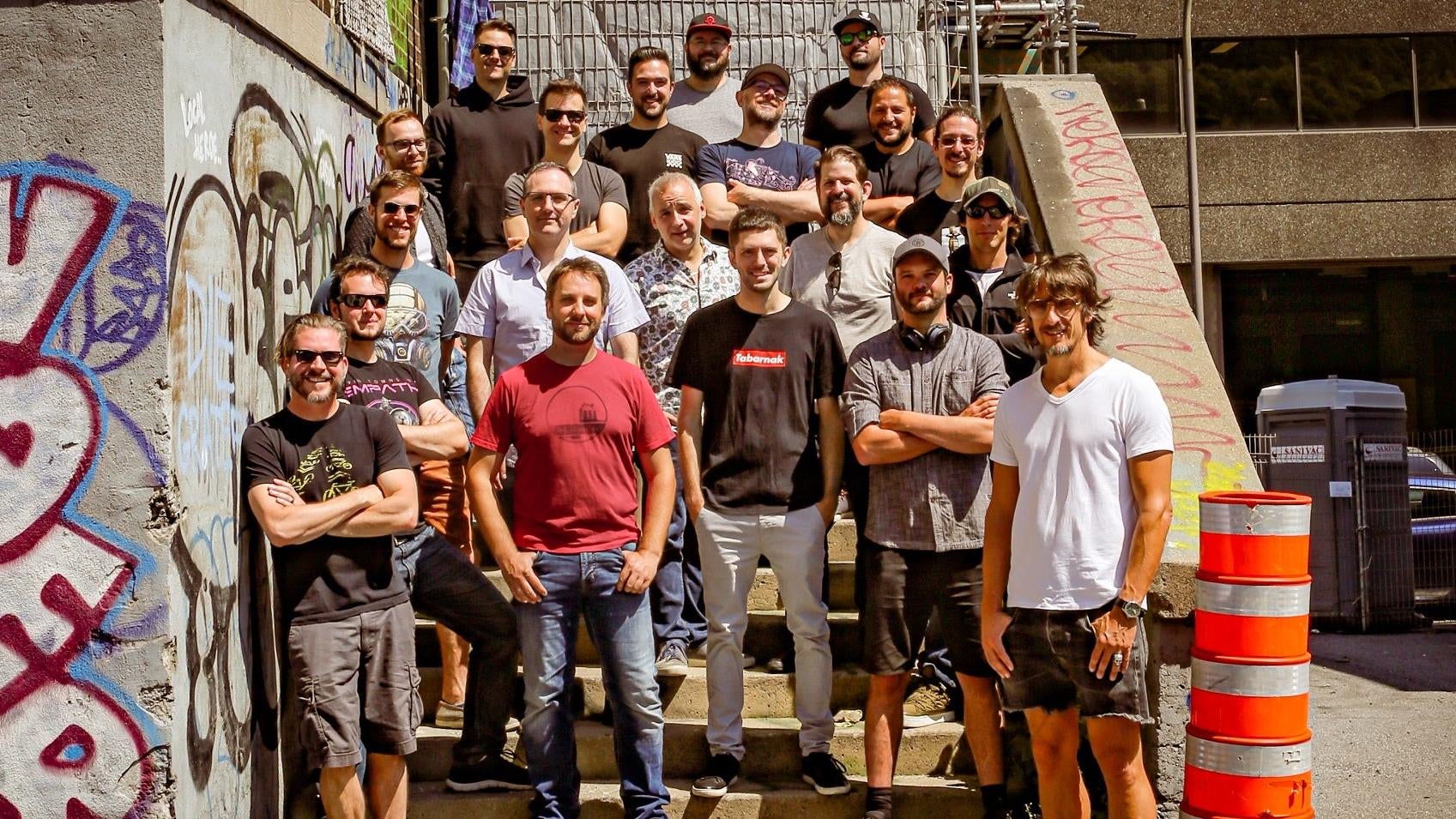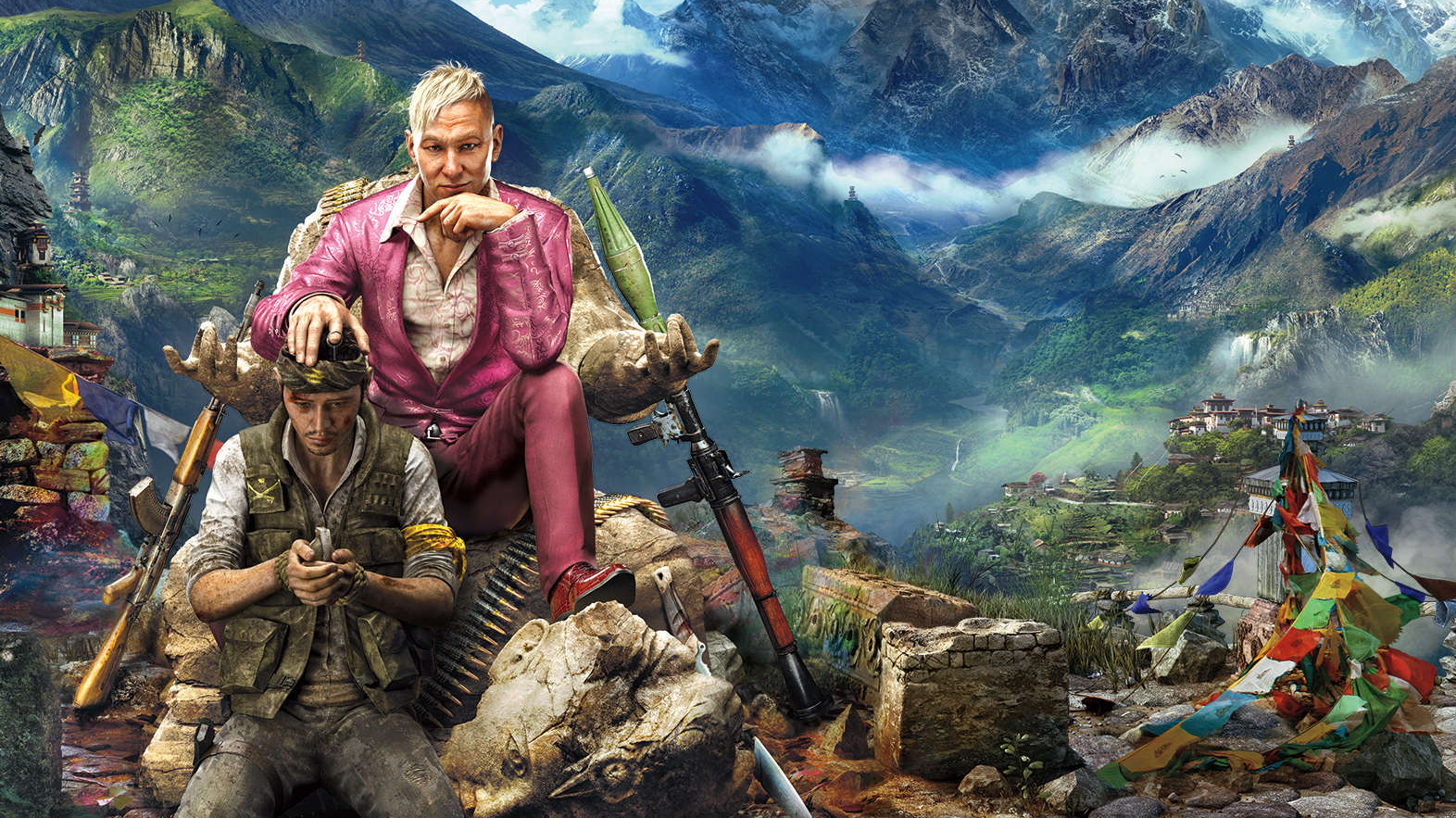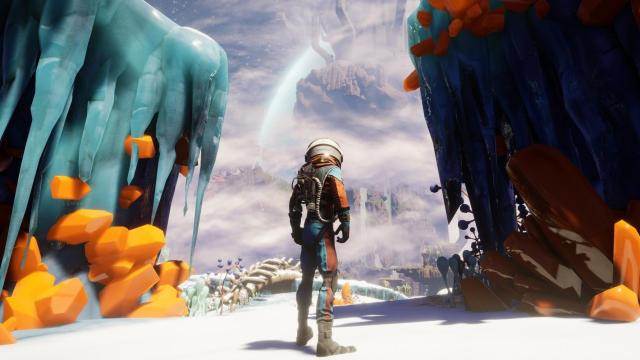Assassin’s Creed III director and former Stadia developer Alex Hutchinson is back with a new studio called Raccoon Logic, as well as some old excuses about its lack of diversity. A picture included in a press release showed the new studio’s staff standing on an outdoor staircase. Of the 20 people present, all are men, though Hutchinson later clarified that there is one woman on staff as a project lead. When social media started criticising this breakdown, he called it “trolling.”
Raccoon Logic is rising from the ashes of Typhoon Studios, which Hutchinson — who is no stranger to saying really absurd stuff — founded in 2017 after leaving Ubisoft. The following year, the studio announced the resource-harvesting sim Journey to the Savage Planet, and in 2019 Google bought the studio to bolster the first-party lineup for its streaming platform, Stadia.
Savage Planet came out in 2020 on almost every platform but Stadia due to an existing publishing agreement with 505 Games. It didn’t make it to Google’s platform until earlier this year, only for the tech company to announce it was shutting down all internal production weeks later. In the months since, Hutchinson, along with Typhoon’s other leads, managed to buy back their IP rights from Google and 505 Games and get a minority investment from Chinese conglomerate Tencent to form Raccoon Logic.

In a sense, it seems like things have come full circle, with Hutchison once again heading up a fledgling new studio. But in the years since Typhoon Studios originally opened, the gaming industry has been forced to reckon more often and more openly with its history of misogyny. While people have been able to see the lack of diversity in games since the industry’s inception, it’s only more recently that some of the worst consequences of the status quo at some of the biggest companies have come out on social media, in reporting, and through lawsuits. In 2018 it was Riot Games. Last year it was Ubisoft. And now it’s Activision Blizzard.
Maybe that’s why Reid Schneider, Raccoon Logic studio head and previously executive producer on Batman: Arkham Knight, mentioned work life in his interview with GamesIndustry.biz. “What I’d like to do moving forward is to really ensure that people are enjoying the ride more,” he said. “I mean, it’s work, it’s never going to be day camp, but we want to make sure people are enjoying their time.”
In a phone call with Kotaku, Hutchinson and Schneider said crunch — extended overtime during game development — didn’t happen on Journey to the Savage Planet (which was criticised for playing into colonialist stereotypes.) Crunch wouldn’t be a feature of their upcoming projects either. The two had vaguer answers on what they were doing to make the studio more diverse. Did they interview any women or people of colour for open roles? Hutchinson wasn’t sure, but said that most of the starting hires were people they’d called directly.
“It’s challenging to find women in engineering roles, which was a lot of the hires that we made,” Schneider told Kotaku. “We very clearly made a point when we said, ‘OK, you know, if we have roles that we are able to have more diverse candidates and the production is one of those areas, then we should make that a priority.’ And fortunately, it worked out. We were able to find a great person to join the team who worked with us.”
“The focus is fairly on gender just in this one photo, but there are so many parts to this,” Hutchinson said. “There’s the compensation that we’re paying people. That’s the amount of holidays to get there, what tasks we ask them to do and whether we force them to perform overtime days. If everyone’s opinion is allowed to be heard, if people are invested in their work and can actually meaningfully make decisions. And I think we’re doing really well at all of those things and then clearly poorly on the gender side. So I feel like there’s a lot of success on one hand so far. And yes. Something we need to improve on.”

It’s not a shocker that a bunch of veteran white guys in game development happened to know a bunch of other white guys in game development. What’s more surprising is that in 2021, mid industry-wide reflection about working conditions and sexual harassment, anyone with meaningful experience and recognition would start a new studio with such an imbalance in worker diversity. It’s much easier to create a poor working environment for marginalised workers when they are treated as an afterthought that will be “improved on” later. And attempting to fix those demographics as you go risks tokenizing the future hires you do make. Without a total rework of developer demographics, especially at the leadership level, marginalised hires face an uphill battle at studios composed of primarily white dudes.
Hutchinson was at Ubisoft for seven years. He was creative director on Assassin’s Creed III, Far Cry 4, and later on the cancelled, unannounced sci-fi game Pioneer. As Kotaku reported in 2019, Hutchinson was eventually removed from that project in 2016 following tensions with the staff, and in 2017 he left to form Typhoon Studios. (Pioneer, meanwhile, was reborn and rebooted until it turned into Rainbow Six Extraction.) Ubisoft Montreal was at the centre of a number of allegations of sexual misconduct and toxic workplace issues last year. Did Hutchinson witness anything during his high-profile time there or learn any important lessons?
“There’s nothing specific on my side,” he said. “And as someone who wasn’t involved, luckily, in any of the nasty stuff there so it doesn’t feel useful to have my opinion on it.”
Hutchinson hasn’t seemed very contrite about re-launching a nearly all-white male game studio either. Going through his replies to the dozens of people asking him questions online yesterday you’d be hard-pressed to find anything resembling an apology or even a simple acknowledgement that, yeah, it sucks. “Another day, another case of “How the heck do these people get funding?” tweeted one person. “20+ years of making people millions of dollars,” Hutchinson responded.
Following Kotaku’s interview with Hutchinson and Schneider, Raccoon Logic PR sent a follow-up statement by Schneider clarifying that the studio interviewed multiple women for its production leadership position and “also interviewed BIPOC people for our other open positions, and look forward to hiring more.”
On Twitter Hutchisnon added an open call for CVs as the studio continues hiring. In other words, if you know of any people who aren’t white men making games in the tiny flyover town of Montreal, let Raccoon Logic know.

Leave a Reply